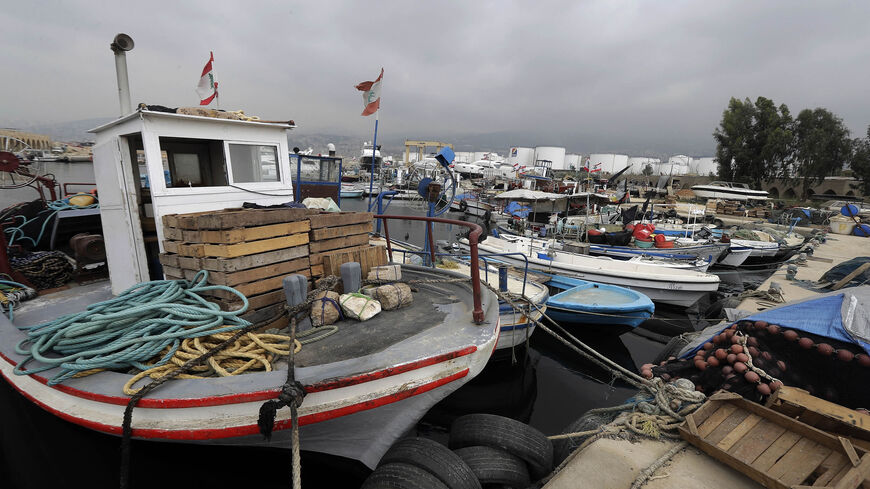BEIRUT — The fishing industry in Lebanon has been traditionally run by men and boats are owned and operated by male fishers but dire economic situation in the country has driven women in coastal areas such as Akkar and Tripoli, to break gender barriers and enter the industry to make ends meet.
"Fishing is all my husband knows, so I decided to join him as we need to support one another as much as we can to overcome these difficult living conditions,” said Zeinah Nassar, a mother of four who lives in an impoverished suburb of Tripoli in the north of the country.
“If we don’t fish, we don’t eat,” she told Al-Monitor. More than 74% of the population in Lebanon has plunged under the poverty line according to the United Nations. With the currency steep devaluation and people losing access to their bank deposits, many Lebanese who have not been able to leave the country are venturing into new industries to to generate income.
In an area reliant on fishing that suffers the highest unemployment rates in the country, learning how to make fishing nets has become more common among women whose partners are fishermen and women have started joining their husbands at sea.
At first, Amal Imam, originally from the Bekaa Valley in the east whose husband is from the north, was reluctant to get involved in a male-dominated sector before she realized that she wasn’t the only woman making fishing nets.
"I was introduced to a lady who organized a training session that took place a few years ago here in the north, dedicated to Lebanese women and Syrian refugees to learn how to make fishing nets,” Imam told Al-Monitor.
“She motivated me to start making fishing nets since my husband is a fisherman. She convinced me that we as local women should embrace this ancient and unique profession,” she said.
#Meet Hanadi Taleb from Lebanon
"I’m doing this because I want to help women".
Hanadi is the head of a women’s cooperative that makes and mends fishing nets for local fishers. Its mission? Help women help themselves.
👉 Read her story: https://t.co/hRO6cEWyZ1 pic.twitter.com/nULwNxyoiQ— General Fisheries Commission for the Mediterranean (@UN_FAO_GFCM) March 8, 2022
Imam now views her work as a craft that combines experience and mastery, providing women with the opportunity to enter the fishing sector without holding a fishing rod or being out on the water.
With a needle in one hand and net in the other, the women work from home repairing the nets their husbands use.
Some elderly women learnt the skill from a family member, and despite their age they keep working in order to deal with the harsh living conditions in the country.
Joumana Aalam, a woman from the northern town of Benin in Akkar governorate, told Al-Monitor that fishing and the craft of making fishing nets have existed for decades in this town and are passed down from one generation to the next. But more support is needed from organizations and charities to assist these vulnerable women and to secure machines to make the sewing process easier instead of working solely with their hands, she said.
Throughout the fishing season, there is plenty of work including repairing the fishing nets that are torn either because of rocks or certain types of fish.
“Due to the current circumstances and the exorbitant price of products, women need help [to become part of the fishing industry] — especially since this interest has evolved over time — as these women do not have the material ability to develop their profession,” said Rasha Masri, a Lebanese socio-economic development researcher at the United Nations Regional Commission (ESCWA).
“While adults cling to their heritage in an attempt to preserve it, young people are reluctant to practice this profession. So we need to find ways to get more people who are in need of an extra income into this profession by making it a smoother process and providing the necessary machines,” she told Al-Monitor.
Breaking barriers
For some women, entering the fishing industry has become a way of life rather than a job. It is a tough field, especially in a traditional society where working women are often judged, and where the fishing industry is predominantly men.
“Even my husband refused my company at first, but I said there is no shame in working to earn a living ethically. I now help with potting and trawling sometimes,” Nada Ibrahim, a mother of three from Akkar who now considers herself a fisherwoman, told Al-Monitor.
Ibrahim and her husband inherited a small vessel from her father-in-law; the boat is precious to them as Ibrahim’s husband grew up on the sea and played along the coast for most of his childhood.
She has been in this profession for the past seven months, but has recently gained confidence to sail with her husband outside the coastal local area.
“Women in Lebanon are not active in this industry — at least here in the north. But I have noticed that more women have recently started getting involved to help their husbands who rely on fishing for a living,” Ibrahim noted.
At first, Ibrahim got seasick but she has now adapted and feels a lot less stressed than when she initially accompanied her husband.
“Now I cannot think of anything more rewarding than spending the day with my husband doing a job that generates us an income where we can afford at least the basics in this terrible period of inflation,” Ibrahim added.
Although Lebanon’s economic crisis has transformed women’s role in the workforce — creating job opportunities previously reserved for men — for experts like Masri the increase in autonomy and responsibilities of women has not been accompanied by equal opportunities, as households headed by women rely more on credit and support from relatives than those headed by men.






